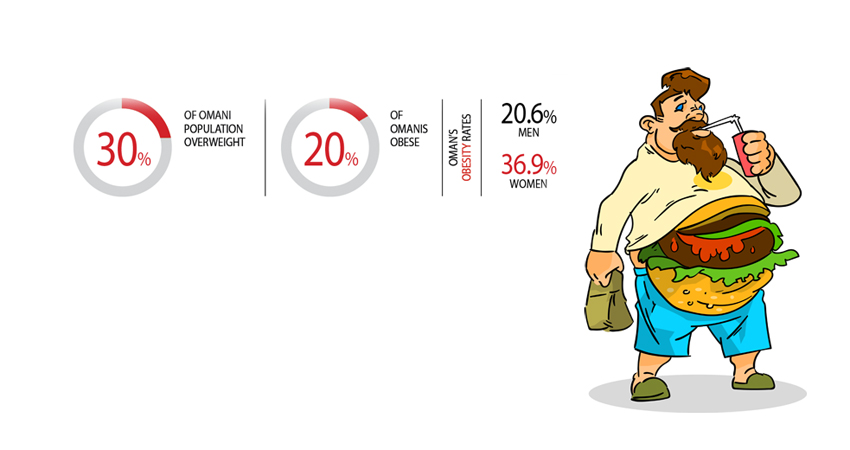

SAMUEL KUTTY -
MUSCAT, MARCH 17 -
Gaining more body weight may not seem like a big deal. But the increase can add up many short- and long-term health problems.
Overweight or obesity over the last two to three decades have already led to many chronic diseases, a trend that threatens healthcare systems, economies, and individual lives, say experts.
World Health Organization (WHO) in its report indicates that Gulf countries have the highest rate of obesity. Kuwait, Bahrain, Saudi Arabia and United Arab Emirates are in the list of top ten countries worldwide in term of obesity.
A medical journal published by the Sultan Qaboos University pointed out that 30 per cent of Omani population was overweight and 20 per cent of Omanis were obese.
“In all, 667,809 Omanis are believed to be overweight, while 445,206 are said to be obese,” the report stated.
A recent report in the medical journal Lancet said Oman’s obesity rates stood at 20.6 per cent among men and 36.9 per cent among women.
Although figures for men in the same group too have seen an increase, the percentage for women is higher at 42.3 per cent compared to 24.5 per cent for young men, from 1980 to 2013.
According to WHO report, Kuwait is affected the worst with 42.8 per cent obese population, this place Kuwait in top 10 most obese countries in the world. Countries such as Saudi Arabia and Qatar are not behind, with 35.2 per cent and 33.1per cent obesity rate respectively.
Prevalence of obesity among children and adolescents ranges from 5 per cent to 14 per cent in males and from 3 per cent to 18 per cent in females. In adult females there is a significant increase of obesity with a prevalence of 2 per cent to 55 per cent and in adult males 1 per cent to 30 per cent.
“Abundant diet that is rich in fats, carbohydrates and processed foods, as well as a lack of physical activity, are the main culprits for the higher number of obese cases”, says a International Journal of Health Sciences report.
Main problem regarding obesity is that common people do not have a good concept of a healthy lifestyle and the importance of daily exercise.
Excess weight is the important risk factor for chronic diseases and is associated with diabetes mellitus, hypertension, cerebral and cardiovascular diseases, osteoarthritis, various cancers, and breathing disorders.
“Most people are using their cars even to go to the nearest place, like the mosque. They have to use their legs instead of their cars. Junk food and energy dense drinks should be avoided”, the report adds.
Lancet estimates that overweight and obesity cause 3.4 million deaths worldwide, four per cent of years of life lost and four per cent of disability-adjusted life years in 2010.
Currently, more than 50 per cent of the 671 million obese individuals in the world live in 10 countries, with 62 per cent living in developing countries.
According to International Journal of Health Sciences, increased public awareness regarding healthy eating habits and promotion of physical activity and exercise is required.
“Mass media both print and electronic is required to create awareness among masses. School base health education will also be effective”, it adds.
Oman Observer is now on the WhatsApp channel. Click here



